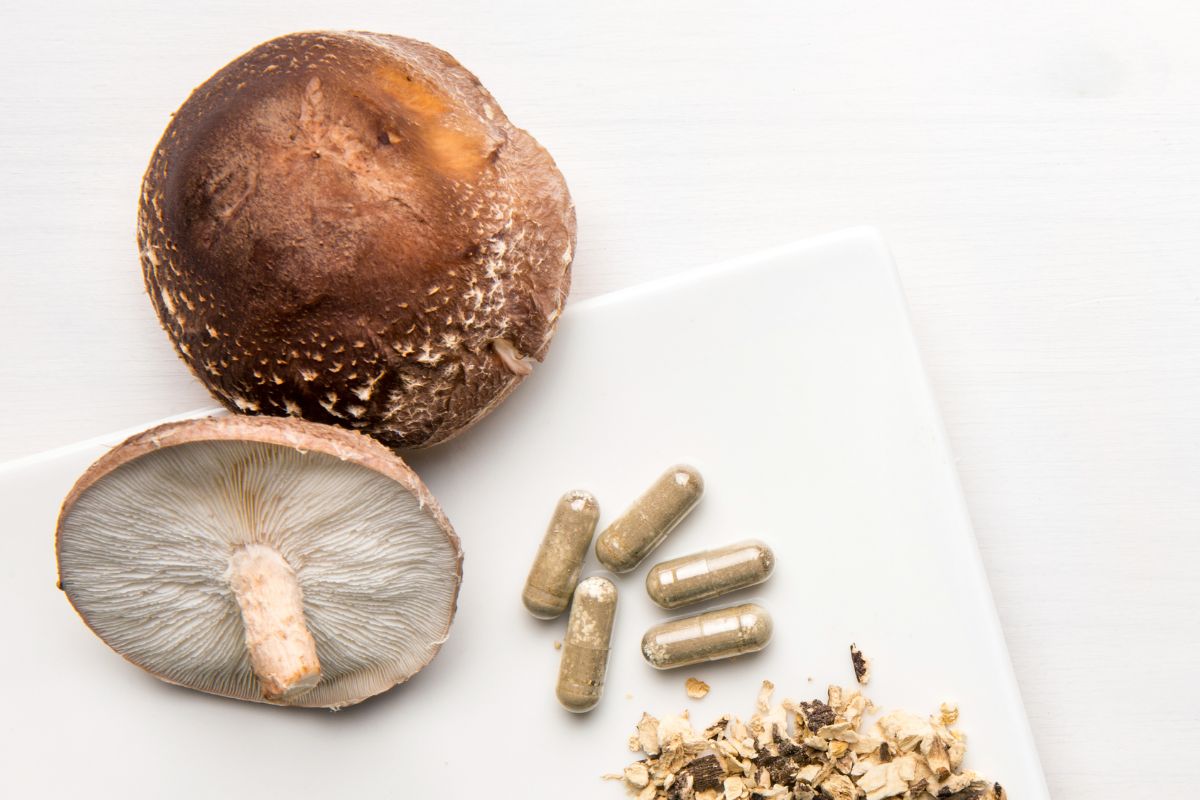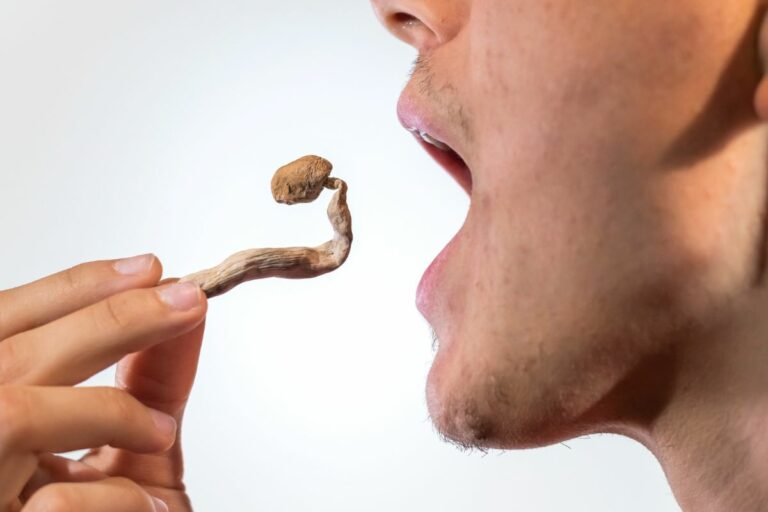Medicinal mushrooms have garnered considerable attention in the world of natural health for their potent healing properties. They are not merely ingredients for culinary delight but are also celebrated for their rich content of bioactive compounds. You might already be aware that these fungi play an essential role in traditional healing practices across various cultures, and now, modern science is beginning to illuminate the full spectrum of their benefits.
With a diverse array of medicinal mushrooms available, it’s important to understand how each type differs in its health-promoting attributes. From the immune system-strengthening qualities of the well-known Reishi to the cholesterol-lowering effects of Shiitake, each mushroom contains unique constituents that can aid different aspects of your well-being. A medicinal mushroom chart serves as a valuable guide, categorizing these fungi based on their therapeutic potential and helping you make informed choices about incorporating them into your health regimen.
Navigating through the complex information about these mushrooms, however, can be challenging without a clear and organized reference. A comprehensive chart not only provides key insights into the various types of medicinal mushrooms but also simplifies their health benefits, allowing for an easy comparison. This enables you to select mushrooms that align with your specific health goals, whether you’re seeking to improve your vitality, manage stress, or support overall wellness.
Medicinal Mushrooms Overview
Table of Contents
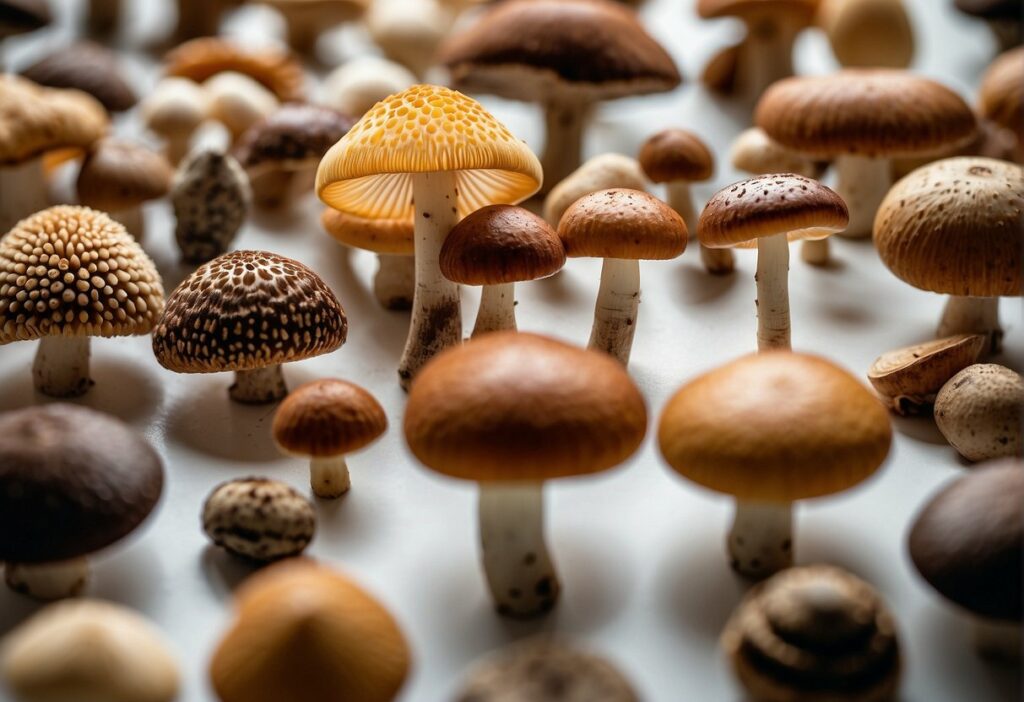
In exploring the realm of medicinal mushrooms, you’ll discover a rich tapestry of history and diverse species, each with its unique nutrient profile and benefits. These fungi have been integral to traditional medicine and continue to captivate with their potential for health and wellness.
History and Tradition
Medicinal mushrooms have been harnessed for thousands of years, particularly within Traditional Chinese Medicine. Species like Ganoderma lucidum (Reishi) were revered for their restorative properties. Modern research now seeks to understand the science behind these ancient practices.
Classification and Species
There are numerous species of medicinal mushrooms, each with unique qualities. Mycologists have classified these fungi into species and varieties based on their distinct characteristics like shape, color, and spore prints. Among these, species such as Cordyceps sinensis and Trametes versicolor (Turkey Tail) are studied for their health-promoting properties.
Nutrient Profile
Medicinal mushrooms are rich in compounds beneficial to your health. They typically contain polysaccharides, like beta-glucans, which have been studied for their immune-boosting effects. Minerals, vitamins, and antioxidants are also abundant, making these fungi nutritional powerhouses.
Common Varieties
When discussing common varieties, you’ll encounter names such as Shiitake (Lentinula edodes), Maitake (Grifola frondosa), and Chaga (Inonotus obliquus). Each of these varieties has been traditionally used for their purported health benefits and are now the subject of scientific interest.
Health Benefits
Medicinal mushrooms have been studied for their potential to enhance overall health, targeting specific areas such as immune support and mental well-being. They boast compounds that may aid in heart health, inflammation reduction, and much more.

Immune System Support
Medicinal mushrooms like the reishi are known for their ability to bolster your immune system. Compounds found in these fungi can enhance the immune response, making you more capable of warding off illness.
Antioxidant Properties
The antioxidants present in varieties such as chaga mushrooms offer cellular protection from oxidative stress, which is linked with aging and various diseases.
Mental Health Enhancements
Some mushrooms have been linked to improvements in mental health, including anxiety and depression relief. For example, lion’s mane mushrooms have shown promise in supporting brain health and may help improve memory and cognitive function.
Heart and Cholesterol Health
Incorporating medicinal mushrooms into your diet may influence your heart health by modifying blood pressure and cholesterol levels, supporting cardiovascular wellness.
Anti-Inflammatory Effects
The anti-inflammatory effects of medicinal mushrooms can be beneficial in managing conditions associated with chronic inflammation, thereby contributing to improved health and reduced risk of certain diseases.
Liver Health and Detoxification
Mushrooms such as reishi are regarded for their liver-supporting capabilities, potentially aiding in detoxification and promoting overall liver health.
Diabetes and Blood Sugar Regulation
Some studies suggest that medicinal mushrooms may help in the regulation of blood sugar levels, offering support for individuals with diabetes or those looking to maintain stable blood sugar levels.
Major Medicinal Mushroom Types
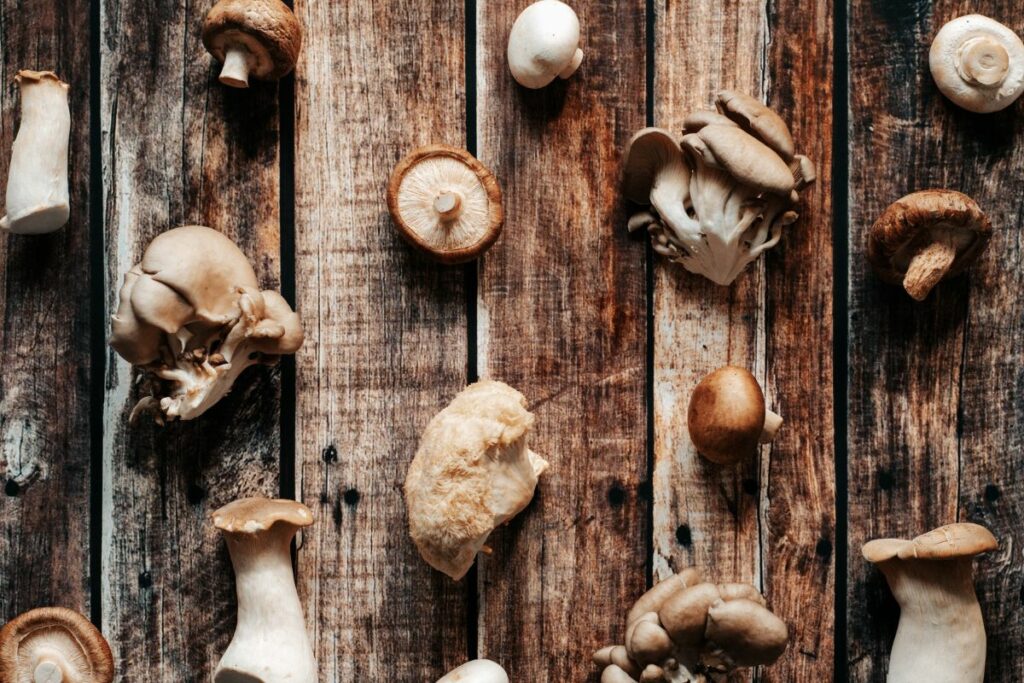
In the realm of health and wellness, medicinal mushrooms have garnered attention for their bioactive compounds. Your exploration of these fungi may reveal various health benefits.
| Medicinal Mushroom | Potential Health Benefits |
|---|---|
| Reishi (Ganoderma lucidum) | Immune support, stress reduction, anti-inflammatory properties |
| Chaga (Inonotus obliquus) | Antioxidant, anti-inflammatory, potential immune support |
| Cordyceps (Cordyceps sinensis) | Energy and stamina, anti-fatigue, potential immune support |
| Turkey Tail (Trametes versicolor) | Immune support, anti-cancer properties, antioxidant |
| Lion’s Mane (Hericium erinaceus) | Cognitive support, nerve regeneration, potential mood enhancement |
| Shiitake (Lentinula edodes) | Cardiovascular health, immune support, potential anti-cancer |
| Maitake (Grifola frondosa) | Immune modulation, potential blood sugar regulation |
Reishi (Ganoderma Lucidum)
Ganoderma Lucidum, known as Reishi, is a mushroom celebrated for centuries, particularly in Japan, due to its medicinal properties. Reishi is considered an organic remedy, potentially supporting immune function and stress reduction.
Chaga (Inonotus Obliquus)
The Chaga mushroom grows on birch trees, rich in antioxidants. This dark, woody fungus is traditionally ground up and used as a tea, contributing to your overall wellness.
Cordyceps
Uniquely, Cordyceps mushrooms have a history of use in Chinese medicine and may increase your energy levels and endurance, according to studies. They often grow on insect larvae, converting them into a fruiting fungal body.
Shiitake (Lentinula Edodes)
Shiitake mushrooms are not only a culinary delight but also a source of important vitamins and minerals. The presence of bioactive compounds in Shiitake may support your cardiovascular health.
Turkey Tail (Coriolus Versicolor)
Known for its colorful, fan-shaped appearance, Turkey Tail contains polysaccharopeptides which might fortify your immune system and help in maintaining your health.
Lion’s Mane (Hericium Erinaceus)
Lion’s Mane is distinguished by its unique, hair-like spines. Consuming this mushroom could benefit your cognitive function, stimulating the growth of nerve cells and potentially enhancing brain health.
Maitake (Grifola Frondosa)
Maitake, or “dancing mushroom,” carries compounds that may help in modulating your blood sugar levels and boosting your immune response due to its beta-glucan content.
Consumption and Use
Medicinal mushrooms offer a variety of ways to enhance your health, from being integrated into your diet to therapeutic uses. Each form of consumption and use comes with its specific benefits and methods, which we’ll explore in this section.
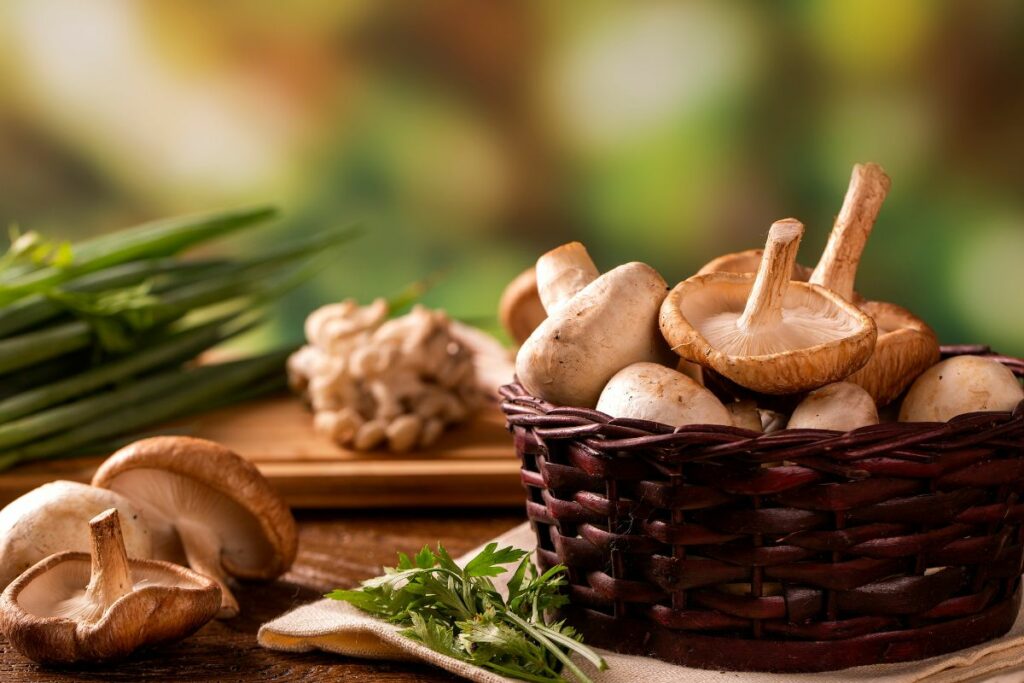
Dietary Integration
Integrating medicinal mushrooms into your diet can boost your intake of protein, fiber, and essential nutrients. Edible mushrooms like shiitake and maitake can be a low-fat source of vitamin D and B-vitamins when included in meals. Aim for varied portions; studies show a range of 3-5 servings per week can support immune health.
Supplements and Extracts
You may choose supplements to ensure a consistent and concentrated dosage of medicinal mushroom benefits. These are available in forms such as capsules, powders, and tinctures. Supplements often contain extracts that provide a higher concentration of bioactive compounds, such as beta-glucans for immune support.
Therapeutic Applications
Mushrooms like the reishi, also known as the ‘mushroom of immortality,’ are reputed for therapeutic uses. Your consumption may target specific health outcomes, such as immune support or enhanced energy. Consult with a healthcare provider to determine appropriate dosages for therapeutic applications.
Preparation Methods
The preparation of medicinal mushrooms can affect their nutrient profile. For instance, tea infusions can extract water-soluble compounds, while soups and broths can also integrate fat-soluble nutrients. Remember to consume preparations like teas and soups warm to maximize absorption of the beneficial compounds.
Scientific Research and Studies
In recent years, scientific research and studies have provided insights into the therapeutic potential of medicinal mushrooms. Through clinical trials, analysis of bioactive compounds, and exploring pharmacological effects, a clearer understanding of how these fungi may benefit health is emerging.
Clinical Trials
Your awareness of clinical trials is imperative as these are the bedrock of scientific validation for medicinal mushrooms’ health effects. Research has demonstrated that substances like beta-glucans and polysaccharides extracted from mushrooms may have anti-cancer and anti-tumor properties. For instance, a study referenced in ScienceDirect discussed the distribution and proportion of mushroom studies, showing significant clinical studies conducted to examine the efficacy of these fungi in treating various health conditions.
Bioactive Compounds
Medicinal mushrooms are a rich source of bioactive compounds including polysaccharides, terpenoids, and ergosterol, which contribute to their antifungal, antibacterial, and antiviral properties. The substance known as nerve growth factor has also been found in some species and is linked to improved cognition and cognitive function. According to a publication on ACS Publications, antioxidant properties of mushrooms were quantified, providing a detailed account of bioactive yields which, in numbers, ranged from 3.97−9.16%.
Pharmacological Effects
Understanding the pharmacological effects of medicinal mushrooms can help you use them as an adaptogen or for their functional properties. The term ‘functional mushrooms’ refers to those that provide health benefits beyond basic nutrition. Springer provides insights into how such mushrooms offer immunomodulating benefits. The anti-tumor effects of specific mushroom-derived polysaccharides are especially noteworthy for their potential in integrative cancer treatments.
Safety and Considerations
When incorporating medicinal mushrooms into your health regimen, it’s crucial to consider potential allergies, interactions with medications, and appropriate dosages. These factors are key in ensuring the beneficial effects such as immune support and gut health, without negative consequences.
Allergenic Potential
Although medicinal mushrooms have been recognized for their contributions to immune health, you should be aware of the potential for allergies. Similar to other foods, mushrooms can trigger allergic reactions that may lead to inflammation or more serious health concerns. It’s important to monitor your body’s response to these fungi, especially if you have a history of allergies.
Interaction with Medication
Medicinal mushrooms can influence the efficacy of certain medications. You might experience interactions that could affect drug metabolism, leading to either an increase in drug potency or a reduction in effectiveness. This is vital if you’re taking medications for conditions like heart disease or bacterial infections. Consulting with a healthcare provider is imperative before mixing mushrooms with your prescriptions.
Dosage and Administration
Determining the right dosage of medicinal mushrooms is key to their effectiveness and safety. Overconsumption might upset your gut health or immune system balance, while insufficient amounts may render them ineffective. Dosage recommendations can vary widely based on the type of mushroom and the form in which it’s taken (e.g., extracts, powders, or capsules). Always follow manufacturer guidelines or a healthcare professional’s advice to ensure proper use.
Frequently Asked Questions
In this section, you will find targeted responses regarding the use and benefits of medicinal mushrooms, which can inform your choices and integration of these natural supplements into your health regimen.
What are the characteristics and benefits of different medicinal mushrooms?
Medicinal mushrooms, such as Shiitake and Cordyceps, possess distinct properties; Shiitake is known for supporting heart health, while Cordyceps enhances energy and stamina. Their benefits range from boosting the immune system to supporting stress reduction.
How do the health benefits of various medicinal mushrooms compare?
Each mushroom species has a unique profile of bioactive compounds. For example, Reishi is celebrated for its calming effects, whereas Maitake may help in blood sugar regulation and Lion’s Mane supports cognitive function.
What are the most effective medicinal mushrooms for boosting immunity?
Research suggests that mushrooms like Reishi, Turkey Tail, and Shiitake have immunomodulating properties, making them effective in bolstering the body’s defense mechanisms.
Which specific mushroom supplements are recommended for overall wellness?
For overall wellness, supplements made from mushrooms like Reishi, Cordyceps, and Chaga are often recommended due to their wide-ranging health benefits, including improving vitality and reducing inflammation.
What are the proven effects of turkey tail mushrooms on health?
Turkey Tail mushrooms are recognized for their high levels of polysaccharopeptides which can enhance immune function and are being studied for their role in cancer therapy support.
How can medicinal mushrooms be integrated into daily diet for optimal benefits?
Medicinal mushrooms can be consumed in various forms such as teas, soups, and powders. Incorporating them into your diet can be as simple as using mushroom powder as a seasoning or adding it to smoothies for an extra health boost.

